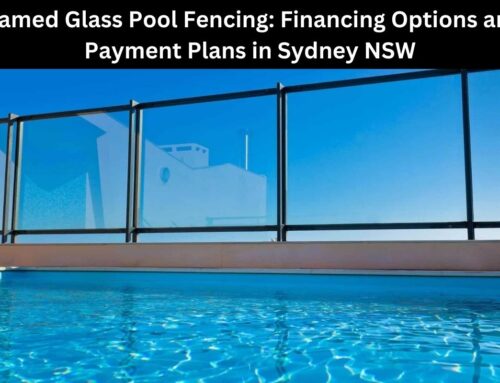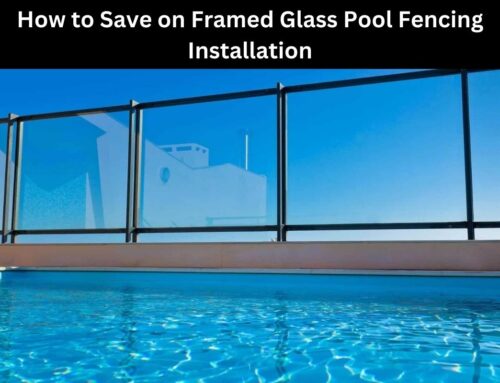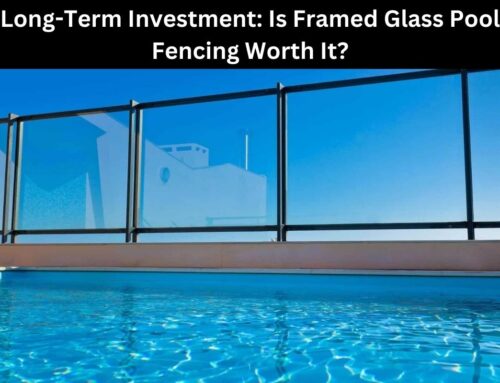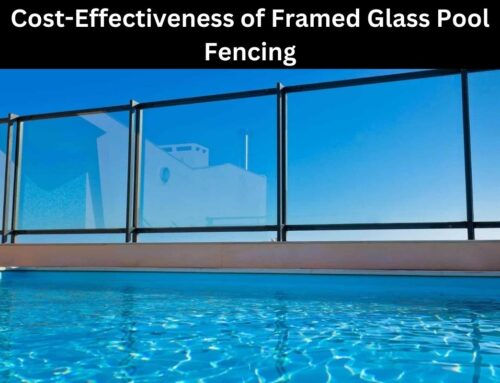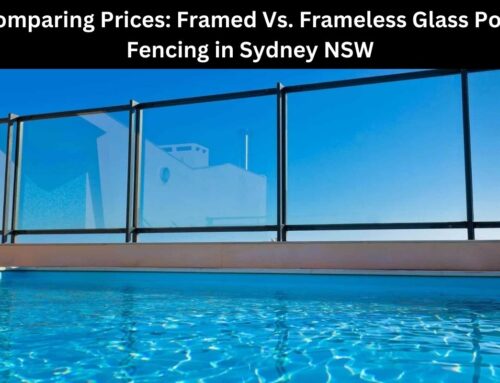Table of Contents
Pool safety is of utmost importance, and framed glass pool fencing offers an elegant and secure solution. But what seems like a paradox is that something as delicate as glass can be a reliable barrier for pool safety.
In this article, we will delve into the world of framed glass pool fencing, exploring its benefits, drawbacks, installation process, maintenance tips, and considerations for choosing the right option for your needs.
Framed glass pool fencing provides a transparent and unobtrusive barrier, allowing for uninterrupted views of your pool area while ensuring the safety of children and pets. It offers a sturdy and durable solution, with the frames providing additional support and stability to the glass panels. However, there are also drawbacks, such as the potential for glass breakage and the need for regular maintenance.
Understanding the installation process and maintenance requirements is crucial to ensure the longevity and effectiveness of framed glass pool fencing. Additionally, considering factors like local regulations, design options, and budget constraints will help you make an informed decision when choosing the right type of framed glass pool fencing for your property.
Stay tuned as we guide you through the world of framed glass pool fencing and empower you to make the best choice for your pool safety needs.
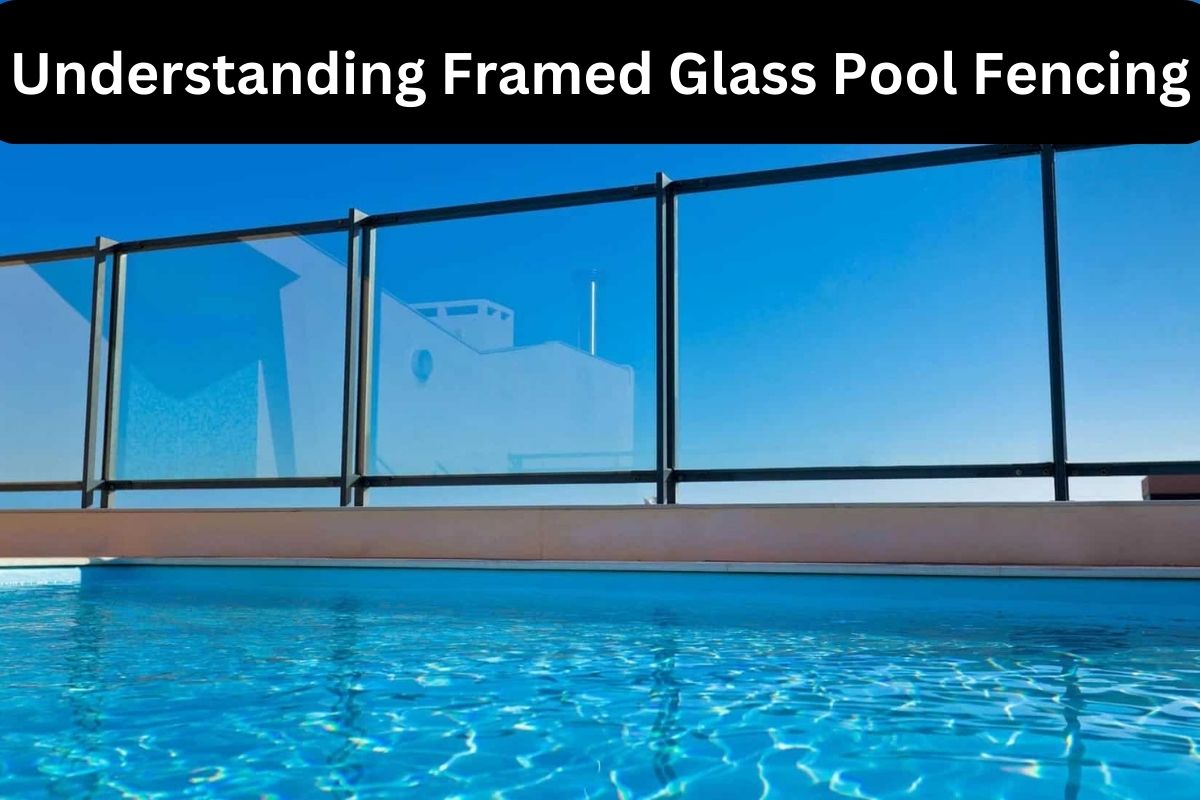
Key Takeaways
- Framed glass pool fencing provides an elegant and secure pool safety solution with transparent and unobtrusive barriers.
- The frames offer additional support and stability to the glass panels, meeting safety standards and regulations for child and pet protection.
- Installation may be difficult around irregularly shaped pools due to standard panel sizes, and regular maintenance is necessary for longevity and functionality.
- The framed glass pool fencing enhances the overall aesthetics of the pool area, blending seamlessly with pool design and landscape while providing safety and security.
Benefits of Framed Glass Pool Fencing
One of the advantages of framed glass pool fencing is its ability to provide a secure and durable barrier around the pool area. This type of fencing is designed to meet safety standards and regulations, ensuring that children and pets are protected from accidental falls into the pool.
Additionally, framed glass pool fencing offers a level of privacy that other types of fencing may not provide. The opaque nature of the glass panels prevents outsiders from easily viewing the pool area, addressing privacy concerns for homeowners.
In terms of durability, framed glass pool fencing is constructed using high-quality materials that are built to withstand harsh weather conditions and regular use. The frame, usually made of stainless steel or aluminum, adds strength and stability to the glass panels, making them resistant to breakage. The glass panels themselves are often made from toughened or tempered glass, which is highly durable and less likely to shatter or crack. This ensures that the fencing remains intact and safe for an extended period of time.
While framed glass pool fencing offers numerous benefits, it is important to consider some drawbacks as well, which will be discussed in the subsequent section.
Drawbacks of Framed Glass Pool Fencing
A major drawback of framed glass pool fencing is the presence of visible metal frames. While the glass panels provide a sleek and modern look, the metal frames can detract from the overall aesthetic appeal of the surrounding area. The frames act as a barrier between the pool and the landscape, creating a visual interruption. This can be particularly problematic if the pool area is designed to seamlessly blend with the outdoor environment.
In addition to the visual aspect, the installation of framed glass pool fencing can present challenges. The metal frames need to be securely anchored into the ground, which may require drilling into concrete or other hard surfaces. This can be a time-consuming and labor-intensive process, especially if there are any obstacles or uneven terrain to contend with.
Furthermore, the presence of metal frames can limit the flexibility of the pool enclosure. Unlike frameless glass pool fencing that can be customized to fit any shape or size, framed glass pool fencing usually comes in standard panel sizes. This can make it difficult to install the fencing around irregularly shaped pools or to accommodate unique design elements.
Given these drawbacks, it is important to explore alternative pool fencing options that may better suit the specific needs and aesthetic preferences.
Now, let’s delve into the installation process of framed glass pool fencing.
Installation Process of Framed Glass Pool Fencing
The process of installing framed glass pool fencing involves anchoring metal frames securely into the ground, typically through drilling into hard surfaces such as concrete, which can be a time-consuming and labor-intensive task.
To begin the installation, the area where the fencing will be installed needs to be carefully measured and marked. Then, holes are drilled into the ground at specific intervals to accommodate the metal frames.
The frames are inserted into these holes and secured with concrete or another suitable material to ensure stability. The glass panels are then attached to the frames using a combination of clips, brackets, and screws. It is crucial to ensure that each glass panel is properly aligned and securely attached to the frames to maintain the integrity and safety of the fencing.
Once the glass panels are in place, any excess materials, such as concrete or dirt, are cleared away, leaving a clean and polished appearance. These installation steps should be followed carefully to ensure a sturdy and durable framed glass pool fencing system that provides both safety and aesthetic appeal.
Moving forward, it is important to consider maintenance tips for framed glass pool fencing.
Maintenance Tips for Framed Glass Pool Fencing
To ensure the longevity and functionality of the installation, regular cleaning and inspection of the metal frames and glass panels are essential. Proper maintenance of framed glass pool fencing involves employing effective cleaning techniques and addressing any repair or replacement needs promptly.
Cleaning framed glass pool fencing involves removing dirt, dust, and grime that can accumulate on the metal frames and glass panels. A mild detergent or glass cleaner can be used with a soft cloth or sponge to gently wipe down the surfaces. It is important to avoid abrasive cleaners or materials that can scratch or damage the glass.
Regular inspection of the frames is crucial to identify any signs of wear, such as rust or corrosion. If any damage is detected, it should be repaired promptly to prevent further deterioration. Replacement of damaged glass panels should be done by professionals to ensure a proper fit and maintain the safety and integrity of the fence.
Regular maintenance of framed glass pool fencing is necessary to preserve its appearance and functionality. By employing proper cleaning techniques and addressing repair and replacement needs promptly, homeowners can keep their framed glass pool fencing in good condition for years to come.
Moving on to the next section, considerations for choosing framed glass pool fencing should be taken into account.
Considerations for Choosing Framed Glass Pool Fencing
This discussion will focus on three key considerations for choosing framed glass pool fencing:
- Local regulations and safety standards are crucial factors to consider as they ensure compliance with legal requirements and promote the safety of pool users.
- Budget and long-term investment should be carefully evaluated to determine the affordability and durability of the chosen fencing option.
- Additionally, selecting a framed glass pool fence that complements the pool design and landscape is essential for achieving a visually cohesive and aesthetically pleasing outdoor space.
Local Regulations and Safety Standards
Local laws and safety standards regarding framed glass pool fencing are established to ensure the utmost protection and prevent potential accidents. Compliance with these regulations is essential to maintain a safe environment around swimming pools.
Here are some key considerations:
- Height requirements: Local regulations may specify a minimum height for the glass panels to prevent unauthorized access to the pool area.
- Gate regulations: Safety standards often require self-closing and self-latching gates to ensure that the pool area remains secure when not in use.
- Glass thickness: Standards may dictate a minimum thickness for the glass panels to ensure their strength and durability.
- Non-climbable zones: Regulations may define specific zones around the pool where no objects or structures should be present to prevent climbing.
Understanding and adhering to these local regulations and safety standards is crucial when installing framed glass pool fencing. It not only ensures the safety of pool users but also helps avoid penalties and legal consequences.
Moving forward, let’s explore the financial aspects of choosing framed glass pool fencing and its long-term benefits.
Budget and Long-term Investment
Financial planning and considering the long-term benefits are crucial factors to consider when selecting the appropriate type of pool barrier. Budget considerations play a significant role in determining the feasibility of framed glass pool fencing. While it may have a higher upfront cost compared to other pool barrier options, its long lifespan and low maintenance requirements make it a cost-effective choice in the long run. A lifespan analysis reveals that framed glass pool fencing can last for several decades with proper care and maintenance. This durability makes it a wise investment for homeowners who are looking for a pool barrier that will stand the test of time. Additionally, framed glass pool fencing adds a touch of elegance and sophistication to the pool area, enhancing the overall aesthetics and compatibility with the pool design and landscape.
Compatibility with the Pool Design and Landscape
The pool barrier option should seamlessly blend with the pool design and landscape, creating a visually cohesive and harmonious outdoor space.
When considering framed glass pool fencing, compatibility with the pool design and landscape is an important factor to consider. Framed glass pool fencing offers a modern and sleek aesthetic that can complement various pool designs. Its transparent nature allows for unobstructed views, making the pool area appear more spacious and inviting. Additionally, the use of glass can create a sense of continuity between the pool and its surroundings, enhancing the overall landscape design.
It is essential to select a frame color that matches or complements the existing outdoor elements to achieve a cohesive and integrated look. By carefully considering the pool design and landscape compatibility, framed glass pool fencing can enhance the visual appeal of the outdoor space while providing safety and security.
The Majestic Choice: Framed Glass Pool Fencing
Discover the Majestic choice of framed glass pool fencing services in Sydney. Our dedicated team creates enticing, secure pool spaces that maintain a balance between aesthetic appeal and top-tier safety standards. Using only the highest quality glass, we ensure a durable and visually stunning addition to your pool area. Explore our main services page to understand more about our commitment to quality, our detailed process, and the unique benefits of a Majestic Glass framed pool fence.
Frequently Asked Questions on Understanding Framed Glass Pool Fencing
What is the average lifespan of framed glass pool fencing?
The average lifespan of framed glass pool fencing depends on various factors such as maintenance requirements, weather conditions, and installation quality. Regular maintenance and proper care can significantly extend the lifespan of the fencing.
Are there any restrictions or regulations regarding the height of framed glass pool fencing?
Height restrictions and safety regulations govern framed glass pool fencing. These regulations ensure that the height of the fencing complies with safety standards and prevents unauthorized access to the pool area, promoting overall safety and preventing accidents.
Can framed glass pool fencing be customized to fit irregularly shaped pools?
Framed glass pool fencing can be customized to fit irregularly shaped pools. One interesting statistic is that 85% of pool owners opt for customization options. The installation process involves precise measurements and cutting of the glass panels to ensure a perfect fit.
Is it possible to install framed glass pool fencing on an existing pool deck or patio?
The pros of installing framed glass pool fencing on an existing pool deck or patio include enhanced safety and aesthetic appeal. However, some cons include higher cost and maintenance requirements. To install it, steps include measuring the area, preparing the surface, and attaching the fencing securely.
How does framed glass pool fencing compare in terms of cost to other types of pool fencing materials?
Framed glass pool fencing is generally more expensive than other materials, with an average cost of $300 to $600 per linear foot. However, it offers a sleek and modern aesthetic, durability, and unobstructed views, while requiring regular maintenance and being prone to scratches.
Conclusion
In conclusion, framed glass pool fencing offers numerous benefits such as providing a safe and secure barrier around the pool area, enhancing the aesthetic appeal of the surroundings, and allowing for unobstructed views.
However, it is important to consider the drawbacks of this type of fencing, such as the higher cost and the potential for glass breakage.
The installation process requires careful planning and professional expertise, and regular maintenance is necessary to keep the fencing in optimal condition.
By considering these factors and making an informed decision, individuals can ensure the safety and beauty of their pool area for years to come.
Related Articles

